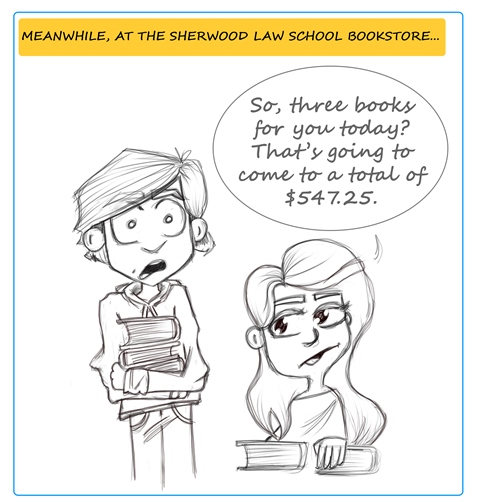by epo
on September 25, 2014
at 9:31 pm
25 September 2014 | Textbooks© | №4
Textbooks are expensive.
This isn’t news to anyone; the students-are-poor-and-textbooks-are-ridiculously-priced affair features heavily in the media across North America. You’ll be hard-pressed to buy a textbook for less than hundred dollars, and frequent updates make purchasing cheaper second-hand editions impossible for most classes.
This is a problem. A problem of national importance. Access to course and reference materials (i.e., textbooks) accounts for 60-70% of a student’s success. There is a direct correlation between GDP and education. Ours is a knowledge economy. And the status quo is making access to knowledge prohibitive.
We typecast the struggle with the poor-student-forced-to-scan-and-liberate-textbooks-from-their-DRM-clutches in one corner versus the greedy-over-charging-prolific-creator-of-useless-new-editions-publishing-companies in the other corner. Can you tell I’m a student? But the sponsor of the stadium is copyright law.
The struggle is the balancing of two competing objectives: (1) pursuing the public policy objective to provide the best education possible while (2) not impoverishing copyright owners. Copyright laws (for reference, I am focusing on Canadian and US copyright laws) are meant to provide authors their just reward while championing user rights; incentivising authors in the public interest to maximize creation and dissemination. Education is a special beast. Most copyright laws acknowledge this through fair dealing (‘fair use’ in the US) – statutory exemptions to copyright law. But fair dealing exemptions for education are narrow.
For example: in Canada, Blackboard is exempt under fair dealing. So, Professor X, seeking to make a couple chapters of Expensive Textbook freely available to his students, goes to post these scanned chapters on Blackboard. But hold! It’s not that easy. Before anything gets posted on Blackboard, it has to go through careful analysis by a Fair Dealing Committee. Professor X’s plans have been foiled. The fair dealing analysis is rigorous and 80% of what gets submitted does not fly. Sorry, Prof X – go start your own undercover private school and make your own rules.
Evidently, we need reform. And there are three factors (among many others; suggestions?) we need to keep in mind if we are to be successful.
Factor one: students are a captive market.
Textbooks are not a luxury to students. And they do not have the capitalist market competition power of choice. They are assigned a book for their class. They need access to that book to succeed in their class. No loopholes (at least, legally).
Of course, there is another side. From the publisher’s perspective, students are a comparatively small, but highly competitive market. There is y number of profs. These y profs will choose one textbook for their class every year. If a publisher is not the chosen one, they lose all of Professor A’s students.
We have a case of ‘willing buyer, willing seller’, where the willing buyer has no choice and the willing seller has a small market to draw profit from.
Factor two: textbooks are expensive to produce.
Textbook publishers and sellers should not be blindly crucified. Theirs is not an easy task.
To develop a textbook, you first need author/s. Your pool of possible candidates is small. Few people are qualified to write a textbook, and of those people, fewer will have the time (amongst courses, research, conferences and other endeavours) to dedicate. Say Publisher finds an author who agrees to write the textbook (or, offers up manuscript to publish) – now Publisher has to pay Author for their highly-skilled labour (i.e., not minimum wage).
Publisher now has its author/s. Step two: putting together the visual design. Publisher needs art. Depending on the discipline, this can get expensive – especially if Publisher needs to find someone to draw an anatomically correct heart; this artist needs to know biology and probably has a specialized degree in scientific drawing.
Step three: reviews. Now Publisher needs to fact-check their book (and drawings). Gathering a group of individuals knowledgeable in the discipline to read through a textbook is not a walk in the park. See step one. These are individuals who have very little time to do this high-skilled labour task. Publisher’s bank account takes another hit.
So, yes, textbooks are expensive. But the reality is that making textbooks is expensive, and there is only a small market of students from which to recoup and make a profit.
Factor three: teachers have their hands tied.
In any discipline, teachers need a medium to disseminate information. True, they could write all the material themselves; as copyright owners, they would then be free to produce, reproduce, publish and transform their work. But is this really what we want? Students should be able to access the teachings and research of, at least, other professors and, in principle, of other people. Our agora is not the individual classroom, but the entire world. Technology makes an instantaneous conversation between a student in Beijing with a researcher in CERN easy. Education, and the materials used in the classroom, should reflect this reality.
Ergo, to provide the best education, teachers assign the best, the most recent and most coveted materials. A teacher today cannot just pass on their own knowledge – the human body of knowledge in any discipline grows daily. In order to succeed, students need to have access to that latest research paper (published exclusively in Expensive Textbook, or with Expensive Licensed Database).
…in sum, The Textbook Affair is no easy fix.
I stated above that The Highway-Robbery-that-are-Textbooks is a problem of national importance. Really, it is a problem of international importance. We are talking about the architecture of the educational system. Students and educational institutions are also essential for innovation. To pull a random example from thin air: did you know that the predominant majority of licensing for pharmaceutical patents comes from university R&D rather than market R&D? It is a key public policy objective to encourage access to educational materials.
I am not advocating a Robin Hood-esque scanning of textbooks. I am advocating effective lobbying. The status quo is not sustainable. On this subject, copyright laws must be reformed.
In the meantime, check out the international editions of your textbooks -though their covers may be uninspiring, pictures scarce and, almost always, entirely black and white- they are usually 1/5 of the price.
keywords: copyright, download, fair use, fair dealing, education, textbooks
©2014-2015 Robin, Who Wears a Hood Powered by WordPress with ComicPress








Discussion ¬